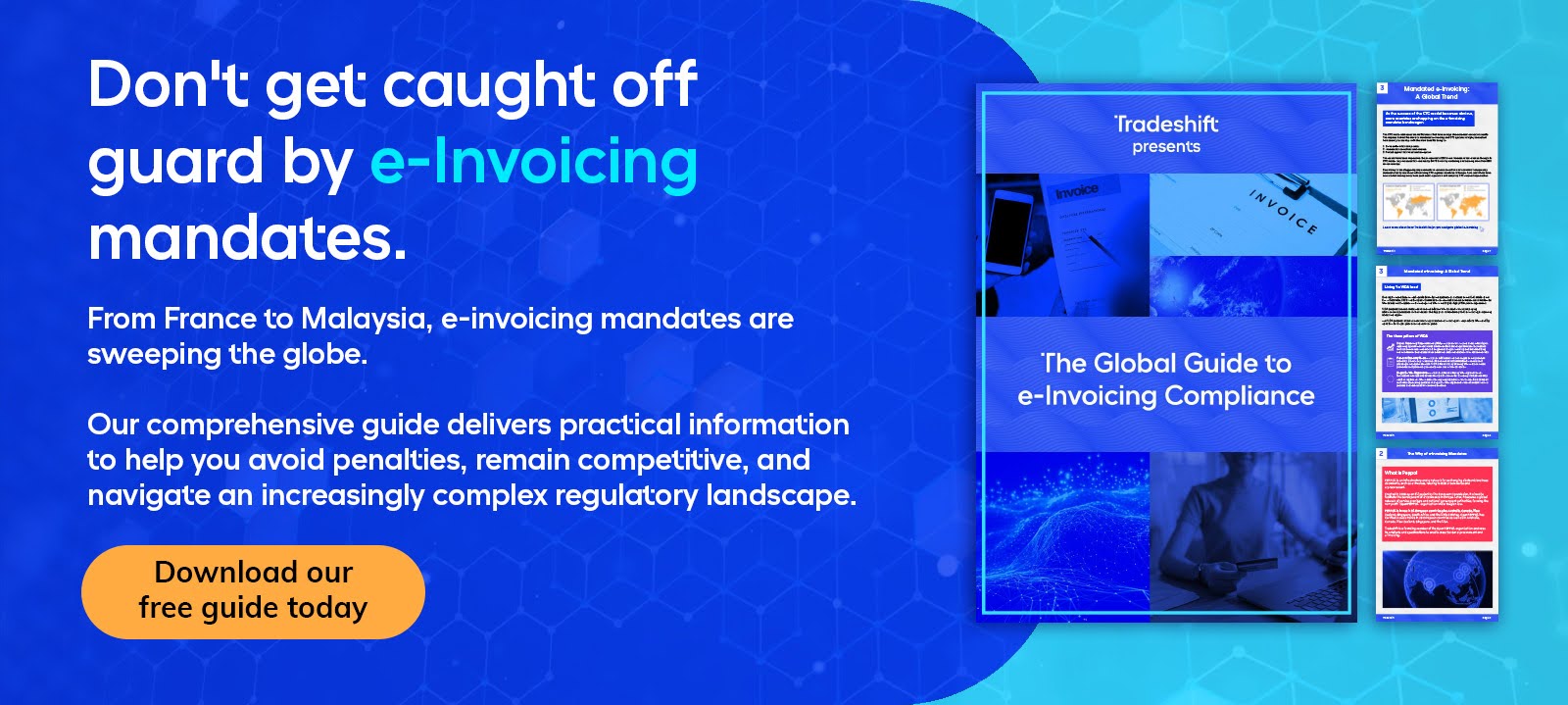Germany update: e-Invoicing mandate finalised
The Growth Opportunities Act’s (Wachstumschancengesetz) e-Invoicing mandates have been reinforced in the final guidelines, offering greater specificity and clarity. Are you ready?
By Ioana Ploesteanu, product marketing manager, Tradeshift
What’s the latest update from the German Government?
Just days after our webinar on the B2B e-Invoicing mandate in Germany, the German Ministry of Finance (MoF) published its finalised guidelines on October 15th.
These guidelines solidify the mandatory use of electronic invoicing (e-Invoicing) in all B2B transactions.
While the core requirements remain consistent with the draft guidelines released earlier this year, the final version provides much-needed clarity and specifics.
Key takeaways from the finalised Wachstumschancengesetz guidelines
- Domestic businesses must be e-invoice ready by 2025: Starting January 1, 2025, all domestic businesses must be able to receive e-invoices. A standard email inbox is sufficient; dedicated e-invoice mailboxes are not mandatory. Alternative transmission methods can be agreed upon.
- No consent is required, but recipients must be equipped: Issuing an e-invoice doesn’t require explicit consent from the recipient. However, the recipient must have the necessary technical infrastructure to receive it.
- Prioritising machine-readable data: In discrepancies, machine-readable structured data (e.g., XML) now takes precedence. While hybrid formats (like Factur-X, which combines XML and PDF) remain an option, the focus is on structured data. This shift ensures greater accuracy and efficiency in processing e-invoices.
- European e-Invoice standards apply: E-invoices must adhere to the European standards outlined in Directive 2014/55/EU, even if using national formats. Formats like Factur-X or Peppol-BIS Billing are also valid for domestic B2B transactions.
- All mandatory information in structured data: The invoice’s structured part (XML) must contain all legally required information.
- One-time e-invoice for ongoing services: A single e-invoice can cover the initial partial service period.
- Invoice corrections must follow European standard: Any corrections to invoices must comply with the European standard EN16931.
Why choose Tradeshift as your B2B e-invoicing platform in Germany?
Whether you’re a buyer or a seller, large or small, Tradeshift’s best-in-class e-invoicing solution empowers you to navigate the complexities of e-invoicing compliance with ease.
For buyers (receiving e-invoices):
- Technical Setup: Receive B2B e-invoices in the formats German authorities require through Tradeshift’s inbound email connection that supports the required document formats.
- Regulatory Expertise: Stay ahead with continuous updates and adaptability to evolving e-invoicing laws and global standards.
- Change Management Assistance: Receive tailored support for your internal adjustments and supplier coordination, ensuring a smooth transition to e-invoicing.
- End-to-End Testing and Validation: With extensive pre-production testing, sandbox environments, and validation phases, ensure operational readiness before mandates.
For sellers (sending e-invoices):
- Fast and efficient onboarding: Our “First invoice onboarding” capability revolutionises seller onboarding, simplifying document transactions even in the face of evolving compliance landscapes.
- Document enrichment: Streamline e-invoice processing with easy document enrichment tools.
- Expand your network: Use the Tradeshift platform to send outbound documents to all of your customers, expanding your reach to buyers beyond the Tradeshift network.
Companies like DHL and Schaeffler rely on Tradeshift to manage e-invoicing and stay up to date with compliance mandates worldwide, not just in Germany.
We offer compliance as a service for over 70 countries, including a streamlined process for complying with clearance mandates in 12 countries.
We’re also the only company offering cross-zone fapiao e-invoicing capabilities in China and among the first to become a registered PDP (PDP immatriculée) in France.

